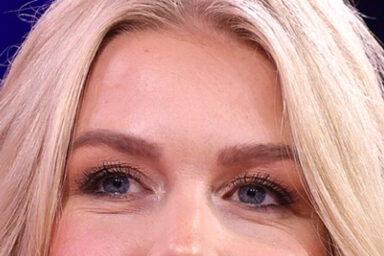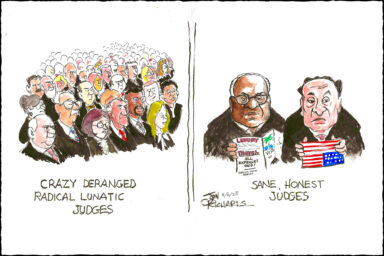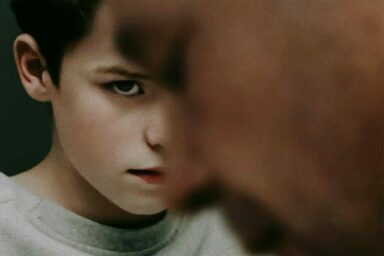Happy Birthday to the Beeb
In the UK, you still need a license to watch television.
|
Listen To This Story
|
On November 14, 1922, a 40-year-old cherubic-looking man with a receding hairline intoned into what looked like a wooden beehive on a rickety tripod. It was what was awkwardly called a “meat-safe” microphone and Arthur Burrows was reading the first news bulletin for the newly created British Broadcasting Company, a scrappy operation that employed a total of four people. The studio was on the sixth floor of a building on the Strand in central London, and from those humble beginnings was launched what is today the internationally recognized BBC (the C eventually standing for “Corporation”).
Their inaugural broadcast reported on a speech delivered by the newly appointed Conservative Prime Minister Bonar Law, who after just a few months in Downing Street was struggling to pull his fractious party together (sound familiar?).
The original remit for the company was a commercial one: to encourage people to buy licensed radio sets and thus help develop a British industry struggling in its infancy. It didn’t initially work as planned, as hobbyists shunned the official sets to build their own. But as programming increased, so did the sale of radios, and an annual license fee was established to finance the ad-free state broadcaster.
The Beeb, as it’s affectionately known here, itself has been responsible over the years for pulling a fractured country together, broadcasting King George VI’s and Winston Churchill’s patriotic speeches during World War II, and the late queen’s reassuring chat during the first COVID-19 lockdown. This is in addition to the monarch’s Christmas message, an annual tradition going back to King George V in 1932, anticipating FDR’s later fireside chats. It was delivered by Queen Elizabeth II for 70 years, usually just after Christmas lunch, showcasing her comfort in front of the BBC’s microphones, as well as her famously clipped accent.
Americans know the BBC chiefly from the imported shows they might have seen on PBS over the years: Doctor Who, Keeping Up Appearances, Fleabag, Fawlty Towers, Luther, Sherlock, Dad’s Army, sundry Jane Austen adaptations (notably the wet-shirt Colin Firth version of Pride and Prejudice), The Great British Bake Off, and Monty Python’s Flying Circus.
That’s an impressive run of programming, but it might give a slightly cockeyed sense of the Beeb, which is both lesser and greater than that list suggests. One of its highest-rated programs is Eastenders, a somnolent soap opera that’s been running since 1985. (That’s nothing; the BBC radio drama The Archers, “an everyday story of country folk,” has been listened to since 1951.) But generally, the schedule suggests an impressive blend of PBS, HBO, NBC Sports, and C-SPAN.
The BBC is such a part of the fabric of British life that it’s often taken for granted, like that other venerated British institution, the National Health Service. But unlike the NHS, the BBC’s funding is a license fee, levied like a tax out of every household with a television.
The current license fee is £159, or $180, which is about the cost of subscribing to HBO Max. Its iPlayer (not accessible in the States) offers eight channels, four dedicated to varied programming, the others including an all-day news, two children’s channels, and a Parliament channel (highlighting Wednesday’s popular Prime Minister’s Questions, when the PM gets grilled live on TV by the leader of the opposition). There’s also dedicated Scottish and Welsh programming. This is all in addition to the regularly scheduled (and streamable) content that includes documentaries, sitcoms, soaps, cooking shows, and sports (including the Olympics, Wimbledon, and the World Cup). The BBC’s film offerings might not be as large as those found on Netflix, but it’s an impressive list, and includes more classics than you’re likely to find elsewhere (its current roster includes Citizen Kane, Top Hat, Bringing up Baby, and The Man in the White Suit).
It used 213 cameras in its recent wall-to-wall coverage of the queen’s funeral, following the procession live from Westminster Abbey to Windsor Castle. The viewership was astronomical by UK standards, but still less than the 31 million who watched the Euro 2020 soccer final, when Italy beat England 3-2. That was on the BBC as well.
If you assumed that such an integral part of Britain’s cultural past century would be celebrated on its centenary, you’d be sadly mistaken. There have been repeated attacks, mostly from the right, on the BBC’s forced funding. It’s a political truism that no party is happy with its news coverage (thus the repeated Republican attacks on the “mainstream media” in America). But as the state broadcaster whose funding mechanism is at the mercy of the government, the BBC is particularly vulnerable to political harassment. (It’s worth noting that when the Labour party was in power, they weren’t overjoyed by their coverage either, though the left has traditionally been less snowflakery about their press criticism.)
Growing up in London, I recall my introduction to films on the BBC, which I much preferred to the commercial station, a big part of its appeal being its lack of ads. (Also, unlike the vaguely ad-free PBS, there were no persistent pleas for money or fundraising drives).
I recall a Marx Brothers festival, every single one of their films shown over 13 consecutive Fridays, followed by a 13-week celebration of early Universal horror films (Dracula, Frankenstein, The Mummy, etc.). It helped that these films were made in black and white, because our (rented) television was similarly monochrome, and shared the same 4:3 ratio as those early movies. Color had come in by then, but those televisions were considerably more expensive to rent, and the license fee for a color set was more as well. I also recall the frisson of watching Monty Python mock the BBC’s own schedule, employing, at one point, the actual evening news anchorman to satirize his own newscast. This had never been done before.
The current license-funding system is guaranteed only till 2027; after that it’s anyone’s guess what the Beeb looks like. With the cost of living crisis in the UK, almost a million people have already ditched Netflix and Amazon Prime this year, which may boost viewership for the nation’s state broadcaster. That might signal a turning point for a national institution that’s too often been taken for granted.
J.B. Miller is an American writer living in England, and is the author of My Life in Action Painting and The Satanic Nurses and Other Literary Parodies.




